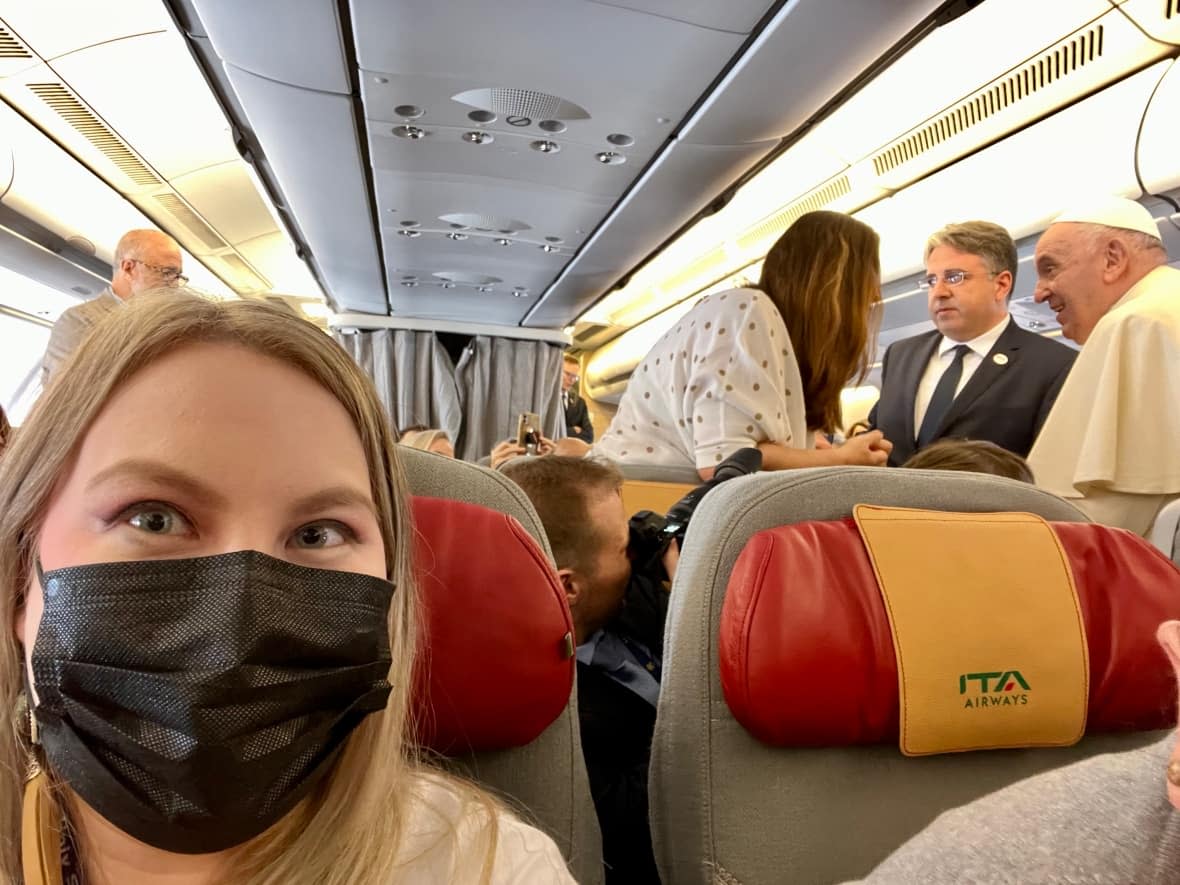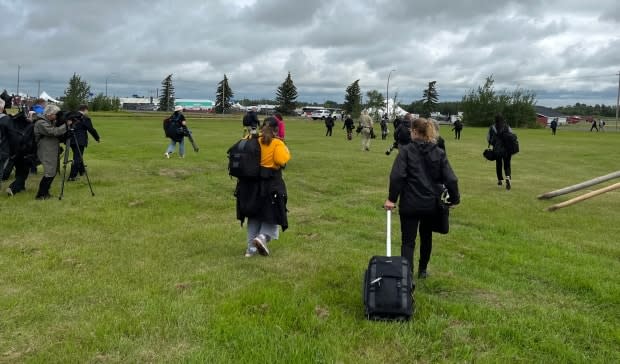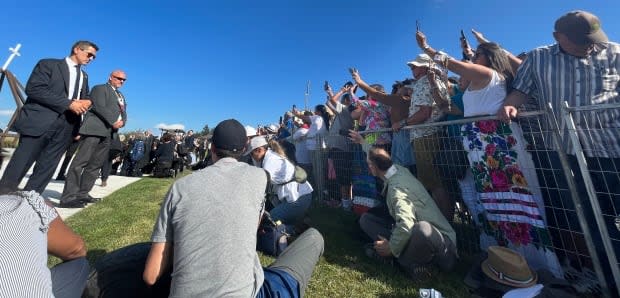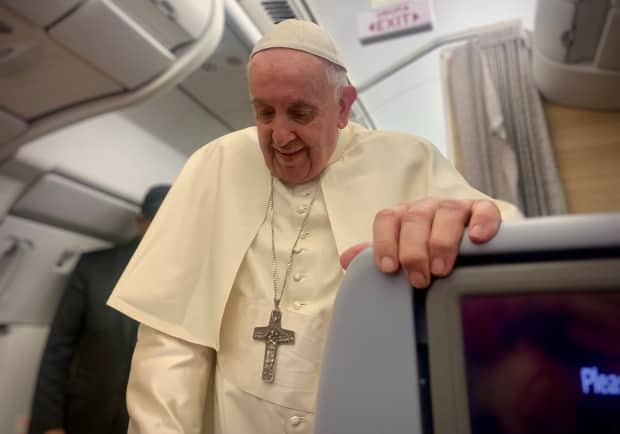Covering Pope Francis's visit to Canada from the papal plane: Reporter's notebook

On a Thursday afternoon at the end of July, I found myself broiling from the body heat of thousands of travellers being corralled through airport security.
I was on my way to Rome, assigned to cover Pope Francis's six-day trip to Canada.
Little did I know that the long lines, waiting, and uncomfortable heat experienced at the airport would foreshadow much of my week covering his "pilgrimage of penance," rather than interviewing residential school survivors about the historic moments that occurred.
I received media accreditation through the Vatican's press office, and needed to fly to Rome to board the chartered ITA Airways flight carrying Pope Francis and his entourage to Edmonton, Quebec City, and Iqaluit.
Seated at the back of the plane were over 70 journalists from across the world. Among the handful of journalists working for Canadian media, myself and Rome correspondent Megan Williams were representing CBC News.

For most of the journalists on the flight, it was just another papal visit — the 103rd papal trip for one reporter I spoke to. But for me, it was an experience that brought many mixed emotions.
My great-grandmother spent most of her childhood at a Catholic-run residential school in Spanish, Ont.
Even though I never had the opportunity to know her, I can see how the lack of love and affection she experienced at the institution was passed down from generation to generation. The inability to hug one another or say I love you is something I've felt, and is a direct result of inter-generational trauma.
It was somewhat comforting to hear the similar experiences from so many survivors and their families I spoke with leading up to the papal visit, and it's a perspective that most other journalists on the flight just didn't have.
Myself and Brittany Hobson, an Ojibway journalist with the Canadian Press, were the only Indigenous journalists among the group. While there were many more Indigenous journalists on the ground at each event, I often felt in the way and isolated among the foreign press.
The journalists boarded at the back of the plane. While we were already seated, the Pope was boarded up front by ambulift. Between us were many curtains and security guards, so I never got a glimpse if he spends his flights napping, watching rom-coms or chatting.
Once we were in the air on our way to Canada, the Pope was escorted to the back of the plane to give a brief speech. He then walked around the cabin, thanking and greeting each one of us.

While it felt surreal to be so close to a religious leader that is revered by some Indigenous people and despised by others, the trip did not live up to my expectations.
I was disappointed that the opportunities to speak with survivors and their families on the ground in Maskwacis and Lac Ste. Anne, Alta., Quebec City and Iqaluit were few and far between for journalists on the papal flight.
We woke up early, were bused to event locations, and often waited around in the hot sun (or rain) cordoned off from attendees while waiting for the Pope to arrive. Getting reaction from Indigenous people immediately after the event was also truncated by being corralled back to buses and the plane for the next event by organizers, the Vatican press office and a large swath of security personnel.

Throughout the entire trip, journalists only had one chance to ask Pope Francis questions. It was during a news conference on the plane from Iqaluit back to Rome.
Reporters working for French media outlets were allowed to ask two questions, the Italian press got two questions, and so on.
In-flight news conference
As the host country, Canadian media also got two questions — and got to go first. We had to come to consensus on two questions as a group. It was decided that I'd ask about issuing a statement on the doctrine of discovery, as it was at the forefront of many discussions last week, while Brittany posed a question about genocide.
I didn't expect for the Pope to ask me a question, wanting clarification and an example of how the doctrine of discovery is still used today to dispossess and dis-empower Indigenous people.
He didn't really answer the question, but he did answer Brittany's question and said he considered the residential school system a genocide — there was the lead and headline for most of us.

We were the only journalists to ask questions relevant to the trip. The foreign press asked about his health, the church's stance on contraceptives, and if he considers himself a Jesuit more than a Pope.
If neither of us were there, would that important moment have occurred?
It wasn't the only time the foreign press surprised me. I witnessed one journalist doing a live hit for television while a Wendat elder performed a ceremony and Gov. Gen. Mary Simon spoke to a small room of dignitaries. It felt disrespectful, as did each time a camera operator or photographer made a snide comment when Indigenous journalists got in the way of their shot.
Problematic terminology, a lack of trauma-informed reporting, tropes and harmful stereotypes are all things that are still prevalent in Canadian media but also felt taken to a new level with the foreign press.
Being mindful that the papal visit was really triggering for some survivors, their families and community members, I tried to provide some levity to the heavy news coverage by sharing photos of all the dogs I came across in Maskwacis, Lac Ste. Anne, and Iqaluit.
Maybe I just missed my own dog, but meeting happy-go-lucky Fluffy and Daisy in Iqaluit was just the therapy I needed to get through the last leg of the tour.

When I wasn't in reporter mode trying to file a story, I kept thinking of my great-grandmother. Would she have wanted to hear the apology? Would this have brought her healing?
While I am glad I got to witness the Pope call the residential school system genocide, it is bittersweet that residential school survivors were not there to hear it.


